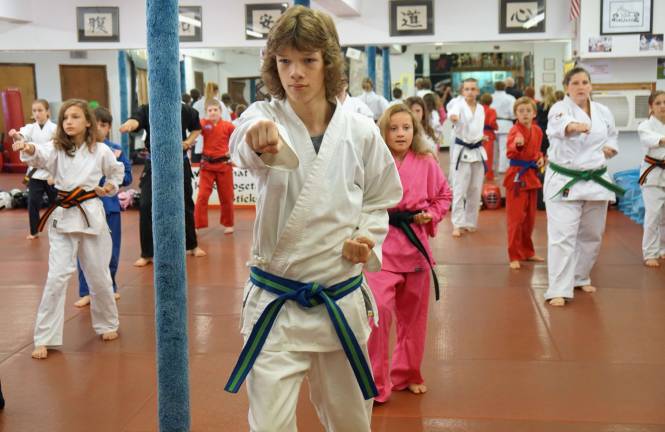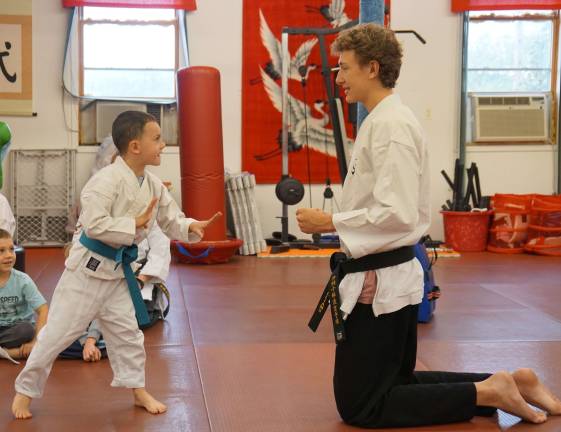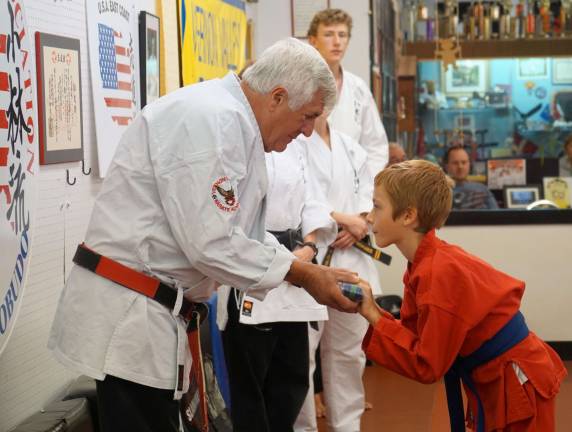Vernon Valley Karate about families



VERNON — The family that kicks together, sticks together,” is the Vernon Valley Karate Academy motto.
Sensei — teacher — and owner, Tom Shull, explained, “It's all families,” and the affordable pricing strategy, without contracts, allows families to learn together.
Recently, a full house of families came to learn from Shull's great baritone voice and fun sense of humor, along with many Vernon Valley home cultivated black belt teachers.
During the Ranger class, four, five, and six year-old students, black belt tenth grader Sensei Cody Williams and Shull worked with the students.
Cody pretended to be a bully, “Hey, Kid! Give me your money,” or “Give me your Legos!”
Little voices bravely fought back, “Stop! Leave me alone!”
At his academy, Shull said, they use the fluid Shurin-ryu style of karate. He said the idea is to defend oneself first peacefully, “But if you have to use your physical force to do that, you defend yourself only to the point that you can get away and end the situation.”
Later, older students sparred and used weapons in intricate kata — an elegant order and way of using self-defense techniques.
The origin of karate, Shull explained, began in the former Ryukyu Kingdom, in what is now Okinawa, Japan. In response to conquering Japanese who forbade the Okinawan peasants from carrying bladed weapons, they instead defended themselves with farm implements.
Some of the farming implements used then, and still today at Vernon Valley Karate, are: “nunchaku:” flails — two sticks connected at the ends by a rope or chain, once used to separate wheat from chaff; “kama:” a bladed weapon used to cut grass or wheat; “tunfa:” a stick with a handle, originally used to turn a mill stone for crushing grain and used today by police like a billy club; “bo:” a six foot staff used for striking, poking, blocking or parrying; and “Eku:” an oar used in fishing communities to fight and defend.
Shull added, karate also uses the “sai,” a metal fork like weapon from China - not a farm tool.
In addition, Shull said, karate also uses all parts of the body as a weapon, emphasizing “kihon:” punching, kicking, blocking, striking; “kata:” putting techniques together and practicing them within a form by one self; and “kumite:” working with another person in order to develop self-defense techniques.
Shull added, the students learn respect, endurance, determination, and positive assertiveness for life.
Also, he said, karate is something for everybody — for people as young as four — to people in their 50's, allowing one to develop “yourself to your own abilities.”
Shull and his wife, Trudy, both retired teachers from the Riverdale Public School System, make their program affordable by charging a monthly tuition for the first family member; then half the monthly tuition for the second; and another half for the third member. Tuition is free for the remaining family members over three. Shull said, it was especially affordable for one of his families of eight people. On top of that, the first month is free, and students may donate $10 to the local PAL.
With his natural gift of teaching, Shull also prepares the next generation of teachers in his free “Elite Karate Leadership Squad,” which begins with ten year-old or older junior black belts. He said, the students learn many of the martial arts philosophies, sophisticated technique, and how to become teachers.
When students are old enough for working papers, Vernon Valley hires and pays them to teach. Shull added, he has quite a staff of high school kids who come through their leadership program.
In addition, the school was recently invited to represent the United States at a UN Exposition in Okinawa, Japan. He and two of his teachers, Matthew Shull and Monica Rolando, trained and performed in the International Karate Shorin-ryu Shurinkai Association opening ceremonies for the newly constructed facility in the city of Naha.